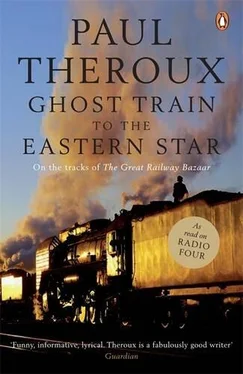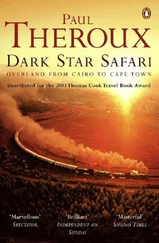Now, thirty-three years older, I had returned to London. To my sorrow, about to take the same trip again, I relived much of the pain that I thought I'd forgotten.
***
NOTHING IS MORE SUITABLE to a significant departure than bad weather. It matched my mood, too, the rain that morning in London, the low brown sky leaking drizzle, darkening the porous city of old stone, and because of it — the rain descending like a burden — everyone was hunched, their wet heads cast down, eyes averted, thinking, Filfy wevva. Traffic was louder, the heavy tires swishing in the wet streets. At Waterloo Station I found the right platform for the Eurostar, the 12:09 to Paris.
Even at Waterloo, the reminders of my old London were almost immediate. The indifference of Londoners, their brisk way of walking, their fixed expressions, no one wearing a hat in the rain yet some carrying brollies — all of us, including honking public school hearties, striding past a gaunt young woman swaddled in dirty quilts, sitting on the wet floor at the foot of some metal steps at the railway station, begging.
And then the simplest international departure imaginable: a cursory security check, French immigration formalities, up the escalator to the waiting train, half empty on a wet weekday in early March. In 1973 I had left from Victoria Station in the morning, got off at the coast at Folkestone, caught the ferry, thrashed across the English Channel, boarded another train at Calais, and did not arrive in Paris until midnight.
That was before the tunnel had been dug under the channel. It had cost $20 billion and taken fifteen years and everyone complained that it was a money loser. Though the train had been running for twelve years, I had never taken it. Never mind the expense — the train through the tunnel was a marvel. I savored the traveler's lazy reassurance that I could walk to the station and sit down in London, read a book, and a few hours later stand up and stroll into Paris without ever leaving the ground. And I intended to go to central Asia the same way, overland to India, just sitting and gaping out the window.
This time, I had been refused a visa to enter Iran, and civilians were being abducted and shot in Afghanistan, but studying a map, I found other routes and railway lines — through Turkey to Georgia and on to the Islamic republics. First Azerbaijan, then a ferry across the Caspian, and then trains through Turkmenistan, past the ancient city of Merv, where there was a railway station, to the banks of the Amu Darya River — Oxiana indeed — and more tracks to Bukhara, Samarkand, and Tashkent, in Uzbekistan, within spitting distance of the Punjab railways.
After that, I could follow my old itinerary through India to Sri Lanka and on to Burma. But it was a mistake to anticipate too much so early in the trip, and anyway, here I was a few minutes out of Waterloo, clattering across the shiny rain-drenched rails of Clapham Junction, thinking: I have been here before. On the line through south London, my haunted face at the window, my former life as a Londoner began to pass before my eyes.
Scenes of the seventies, along this very line, through Vauxhall, and making the turn at Queenstown Road, past Clapham High Street and Brixton and across Coldharbour Lane, a name that sent chills through me. Across the common, in 1978, there had been race riots on Battersea Rise, near Chiesman's department store ("Est. 1895"), where clerks sidled up and asked, "Are you being served?" I bought my first color TV set there, near the street on Lavender Hill where Sarah Ferguson, later the Duchess of York, lived; on the day her marriage to Prince Andrew was announced, my charlady, carrying a mop and bucket, sneered, saying, "She's from the gutter."
We were traveling in a deep railway gully, veering away from Clapham Junction, and from the train I got a glimpse of a cinema I had gone to until it became a bingo hall, the church that was turned into a day-care center, and beyond the common the Alfarthing Primary School, where my kids, all pale faces and skinny legs, were taught to sing by Mrs. Quarmby. These were streets I knew well: one where my bike was stolen, another where my car was broken into; greengrocers and butcher shops where I'd shopped; the chippie, the florist, the Chinese grocer; the newsagent, an Indian from Mwanza who liked speaking Swahili with me because he missed the shores of Lake Victoria; the Fishmonger's Arms — known as the Fish — an Irish pub where refugees from Ulster swore obscenely at the TV whenever they saw Prince Charles on it, and laughed like morons the day Lord Mountbatten was blown up by the IRA, and where, every evening, I drank a pint of Guinness and read the Evening Standard; this very place.
From scenes like these I had made my London life. In those days I prayed for rain, because it kept me indoors — writing weather. So much of what I saw today was familiar and yet not the same — the usual formula for a dream. I looked closer. The trees were bare under the gray tattered clouds, and most of the buildings were unchanged, but London was younger, more prosperous. This district that had been semi-derelict when I moved here — empty houses, squatters, a few aging holdouts — had become gentrified. The Chinese grocer's was now a wine shop, and one of the pubs a bistro, and the fish-and-chip shop was a sushi bar.
But the wonderful thing was that I was whisked through south London with such efficiency, I was spared the deeper pain of looking closely at the past. I was snaking through tunnels and across viaducts and railway cuttings, looking left and right at the landscapes of my personal history and, happily, moving on, to other places that held no ambiguous memories. Don't dwell on it, the English say with their hatred of complaint. Mustn't grumble. Stop brooding. It may never happen.
I loved the speed of this train and the knowledge that it wasn't stopping anywhere but just making a beeline to the coast, past Penge, Beckenham, Bromley — the edge of the London map and the old grumpy-looking bungalows I associated with novels of the outer suburbs, the fiction of twitching curtains, low spirits, and anxious families, especially Kipps and Mr. Beluncle, by the Bromleyites H. G. Wells and V. S. Pritchett, who escaped and lived to write about it.
In the satisfying shelf of English literature concerned with what we see from trains, the poems with the lines "O fat white woman whom nobody loves" and "Yes, I remember Adlestrop" stand out, and so do the trains that run up and down the pages of P. G. Wodehouse and Agatha Christie. But the description that best captures the English railway experience for me is Ford Madox Ford's in his evocation of the city, his first successful book, The Soul of London, published a hundred years ago. Looking out the train window, Ford speaks of how the relative silence of sitting on a train and looking into the busy muted world outside invites melancholy. "One is behind glass as if one were gazing into the hush of a museum; one hears no street cries, no children's calls." And his keenest observation, which was to hold true for me from London to Tokyo: "One sees, too, so many little bits of uncompleted life."
He noted a bus near a church, a ragged child, a blue policeman. I saw a man on a bike, a woman alighting from a bus, schoolchildren kicking a ball, a young mother pushing a pram. And, as this was a panorama of London back gardens, a man digging, a woman hanging laundry, a workman — or was he a burglar? — setting a ladder against a window. And "the constant succession of much smaller happenings that one sees, and that one never sees completed, gives to looking out of train win dows a touch of pathos and of dissatisfaction. It is akin to the sentiment ingrained in humanity of liking a story to have an end."
Читать дальше












